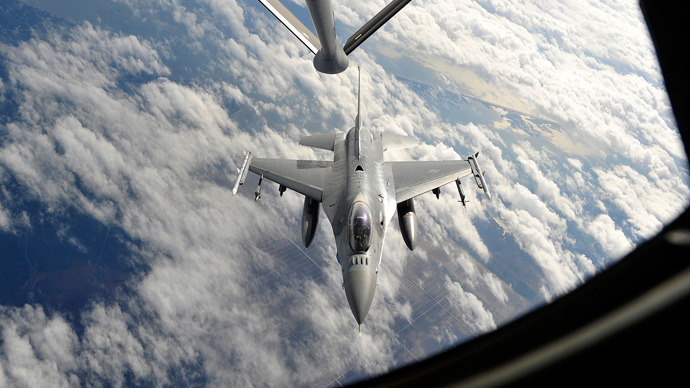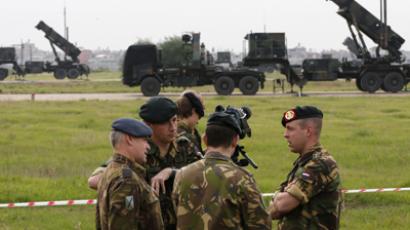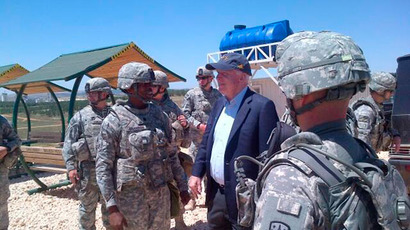US missile defense system may remain on Jordan-Syria border after drills

The US will deploy Patriot missile batteries and F-16 fighter jets in Jordan for military exercises, and the weapons may remain there indefinitely due to the threat of the Syrian civil war. The US has declined to comment on the size of the deployment.
The missile defense systems were "approved for deployment to Jordan as part of Exercise Eager Lion," AFP quoted US Central Command spokesperson Lt. Col. T.G. Taylor as saying. "In order to enhance the defensive posture and capacity of Jordan, some of these assets may remain beyond the exercise at the request of the government of Jordan," he added.
The US has so far refused to reveal how many F-16s are being deployed, or how many of them will remain in Jordan after the exercises conclude. Jordanian officials have confirmed that the missile defense systems are being sent, vowing they will only be used to defend the country from potential missile attacks.
#US military also deploying personnel 2 #Jordan 2 assess military options & help #Jordan coordinate humanitarian efforts
— PaulaSlier_RT (@PaulaSlier_RT) June 4, 2013
Jordan, an ally of Washington, shares a border with Syria and has seen a huge influx of Syrian refugees displaced by the conflict.
Russia has condemned the US decision, arguing that the deployment will only “pump more weapons into an already explosive region,” Russian Foreign Ministry spokesperson Aleksandr Lukashevich said. Lukashevich noted that that missile defense system will be placed close to Syria, which is still embroiled in a conflict that “Russia and the US are trying to resolve with an international peace conference.”
The Patriot batteries are capable of shooting down Scud or other short-range missiles – which are known to be part of the Syrian military's arsenal – and could be used to enforce a no-fly-zone over Syria.
NATO previously deployed Patriot batteries along the Turkey-Syria border, and a contingent of 1,200 soldiers to operate them. The Syrian government criticized the NATO deployment as a provocation, and Russia and Iran have likewise protested the move.
Russia is often criticized for its commitment to ship S-300 missile batteries to Syria as part of a contract signed several years ago. Moscow maintains that the deal does not violate international law, and may help stem violence in the country.
The general director of MiG – the Russian arms manufacturer that makes the jets of the same name – told Russian news agencies on Friday that a Syrian delegation was in Moscow to discuss the terms and deadline for a new contract to supply “more than 10” MiG-29 M/M2 fighters.
Washington’s decision could spark further worries about its increasingly assertive role in the Syrian conflict.
The EU lifted an arms embargo on Syria at the end of May, allowing European countries to “fully support” the rebels fighting against the government of President Bashar Assad. Washington has praised the development as giving Europe more flexibility to ramp up pressure on Assad.
Moscow maintains that the Patriot deployment is both counterproductive and potentially unlawful, since delivering arms to non-governmental actors against the wishes of that country’s government is a violation of international law. Such moves are forbidden by both UN-level treaties on arms trade and the EU’s own guidelines.
In a further development, the White House has reportedly asked the Pentagon to outline plans for a military no-fly zone over Syria. A no-fly zone is often enacted as a final precaution before military intervention.
So far, the US has been reluctant to directly intervene in the Syrian conflict, saying it was only a remote possibility. Still, US lawmakers have on several occasions pushed for the US to adopt a more aggressive stance.
Republican Senator John McCain (R-AZ), a staunch advocate for supplying military aid to the Syrian opposition, made a surprise visit to war-torn Syria at the end of May to meet with the rebels.
The conflict in Syria has now entered its third year, with Damascus the site of frequent bomb attacks. At least 80,000 people have been killed since the uprising against President Assad began in March 2011, according to UN estimates.














